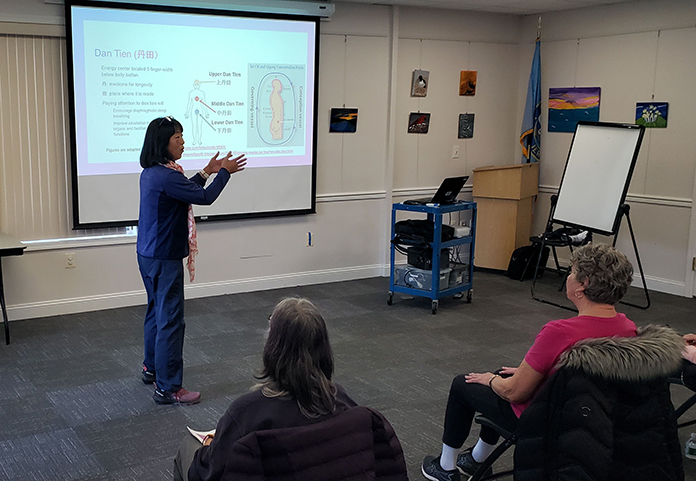
JACKSON – For many, starting out the new year with a focus on health is at the top on the resolutions list. A recent program called “Qigong: for Health and Life Energy” at the Manchester Library fit that goal nicely.
The program, sponsored by the Friends of the Manchester Branch, featured presenter Sachiko Komagata, a licensed physical therapist who incorporated Tai Chai and Qigong in rehabilitation of individuals with a variety of diseases and injuries.
She works at Georgian Court University as an Associate Professor in Integrative Health and her additional titles are Director of Advising and Program Director of Integrative Health.
“Our program is a part of Hackensack-Meridian Health School of Nursing and Wellness at GCU. I teach both undergraduate and graduate courses in Integrative Health, but also teach Tai Chi and Qigong as a physical education activity course at GCU,” she said.
Qigong uses movement, breathing and meditation to your life energy (qi) and enhances your awareness of qi within your body as well your surroundings.
Her recent workshop at the Manchester Library helped individuals learn about qigong and how to incorporate it into their daily routine and to enhance their quality of life.
“I went to Georgian Court University for a program with a friend who introduced me to it. I wanted to learn more,” Whiting resident Jeanne Kineyko said. She was one of the more than 20 people who attended the program.
Komagata stressed that, “Qigong is for everyone. No matter your mobility and fitness level or age. Anyone can learn. It is something you can initiate on your own and at your own pace.”
“Qigong has a long history and therefore and if you learned it from someone you could learn it totally different from another person. That is one disclaimer I wanted to share with you. If you learn something different today, great,” she added.
“That doesn’t mean that something you learned before is wrong or right. There are just so many ways to practice,” Komagata said. She presented a short background on the practice before imitating some practice sessions.
Komagata said there were some key concepts that she wished to share with the audience. “The Qi part meaning air, a life force and energy that goes through your system or body, the gong part, means cultivating as self-practice.”
She further explained that the technique helps individuals “work with the chi energy that is already within you. Someone in Canada said it was cultivating a relationship with energy and becoming aware of energy and how it circulates and flows through your body. I like that definition best.”
“Qigong originated in China over 1,000 years ago. It can be practiced wherever you are and you may not need physical movement at all. There are many ways people practice,” she said.
One question from the audience was whether the practice was aimed at adults only. “Children can practice. I have a child and when she was young, she was taught the practice,” Komagata replied.
She also urged those involved with it to continue with regular practice of at least every week. “Continuous practice seems to give individuals the most health benefit. Some of the research shows there is a psychological benefit with a reduction of anxiety or a reduction of depressive episodes which is a positive for everybody. We want to feel better and mental is just as important as physical health.”
Komagata told The Manchester Times after the program, “so many people have anxiety and depression today. Those that come to Tai Chi or Qigong classes are able to capture a little piece of peacefulness and even that little bit, I think is helpful.”
Komagata added that professionally, “I was working as a physical therapist at an acute care hospital in Philadelphia suburb for over a decade. As a physical therapist, I used Tai Chi and Qigong principles in some of the movement therapies. Then after completing my PhD at Temple University, I took the Assistant Professor position at GCU in 2004. I have learned and practiced Tai Chi and Qigong for on and off over 30 years, but for the past four years or so, I am practicing regularly almost daily. I have been searching for an organization and instructors all this time and I finally found Tai Chi for Health Institute which helped me practice more consistently.”







